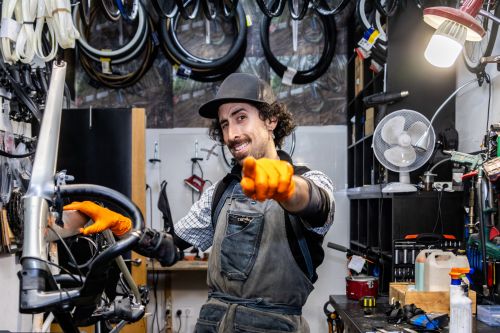In last month's piece, I brought up the subject of authenticity: what it is, why it's important, and why there's so little of it in the cycling industry. I talked with Authenticity.co founder Mark Sperling about these and other topics and came away with the conclusion that, with a few notable exceptions, authenticity is a commodity sorely lacking amongst cycling brands.
I still feel that way. Authenticity, after all is a set of values and practices developed by a company founder — Sperling calls it "the company's DNA" — and manifested in literally everything the company does, from product development and marketing to how the brand conducts itself within the community at large.
You can't successfully fake it. Brands have to walk the walk in everything they do. If authentic brands they slip up (and sometimes they do, nobody's perfect), they own their mistakes, communicate them openly and honestly, and strive to do better.
Sound like most bike industry brands you know? Me neither.
However, it has occurred to me that there is a segment of the cycling industry where authenticity can still be found. Not in the majority of businesses, to be sure, but in enough of them to make a difference that bears talking about.
I refer, of course, to a select number of independent bike shops.
Authenticity is where you find it
It isn't something you can buy. It's something you earn over time.
Many communities still have one or more authentic bike shops, and these are treasures beyond price. Often, the founder is still active. Where they are not, the tradition is carried on with unwavering intent. Core values and principles are clearly articulated and communicated by management to everyone on the staff.
Customers can see it the minute they set foot inside. It shows up not just within the retail environment, but on group rides, in community outreach, communications, and literally everything the company does, from the storefront windows and signage up front to the condition of dumpster out back.
It isn't something you can buy. It's something you earn over time. But the shops that practice true authenticity have something that slick marketing and corporatespeak can never duplicate. And it shows.
By their very nature, independent bike shops are local (or sometimes regional) enterprises. They don't have the national or international footprint to earn votes in the Authenticity 500. But that doesn't make them any less important — or any less genuine.
'A perfect match'
"I think it's a perfect match. These dealers are working really hard and committed to the community. [They're] the real heartbeat at the core of our retailer network."—Heather Mason, NBDA executive director
How many truly authentic bike shops are there in the USA? Frankly, I have no idea. But for purposes of discussion, let's guess it's 1% of the overall dealer population. That would make the total somewhat less than a hundred, and if Georger Data Services' numbers are correct as of early November, right about 85.
I put the question to NBDA executive director Heather Mason. While the NBDA doesn't have tools to measure authenticity directly, she says, she hypothesizes that those qualities map pretty closely to what they found in the NBDA Retailer Excellence Awards.
"I think it's a perfect match," she told me in a phone conversation. "These dealers are working really hard and committed to the community. [They're] the real heartbeat at the core of our retailer network, based on feedback from the dealers, their employees and their communities."
Additional criteria for inclusion in the Retailer Excellence Awards include dealer financials, business benchmarking, performance against KPIs, hosting events covered by the local press, and a series of collaborative virtual meetings.
In 2025 the NBDA awarded just 89 REAs, probably pure coincidence for being so close to my 1% estimate for authenticity, but certainly an elite cadre of USA retailers in any case.
Applications for 2026 REAs open on November 15th. Retailers do not need to be NBDA members to participate. Details will be published in BRAIN at that time.
Meanwhile, if you know of bike shops that meet the threefold criteria for authenticity — founder-led, clear mission and values, and their presence put into practice in everything the shop does — drop me a line at rick@rvms.com. Your input could spark more pieces like this one.
Authentic bike shops are the true industry leaders. Not necessarily the biggest, but in many ways the best among us, leading the way forward, showing the rest the industry how it's done.
And I think it's time for the rest of us to start paying attention to them.


